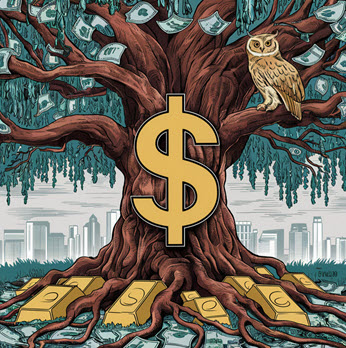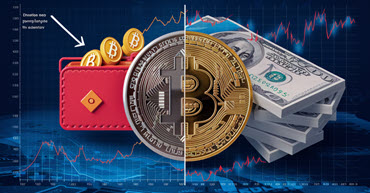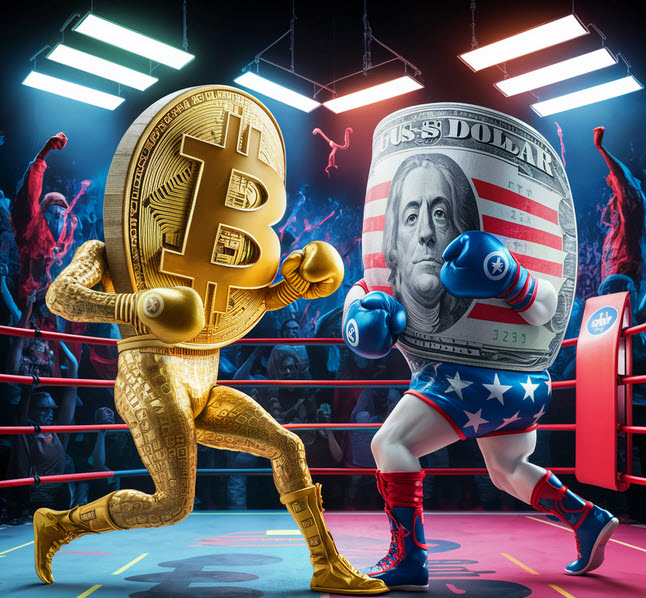Are You Ready for the Future of Money? Bitcoin vs. US Dollar Explored!
Money makes the world go round, but what happens when new forms of money challenge the old? Today, we’re diving into the epic battle between Bitcoin and the US Dollar. Which will come out on top? Let’s find out!
What is Bitcoin?
Bitcoin is a type of digital currency known as cryptocurrency. Created in 2009 by an unknown person (or group) using the name Satoshi Nakamoto, it operates on a technology called blockchain. Unlike the US Dollar, Bitcoin is decentralized, meaning no single institution controls it.
What is the US Dollar?
The US Dollar (USD) is the official currency of the United States. It’s a fiat currency, which means it’s not backed by a physical commodity like gold but by the government’s promise. The Federal Reserve manages its supply and stability.
Why Bitcoin is Gaining Popularity
- Limited Supply: There will only ever be 21 million Bitcoins, making it a scarce resource.
- Decentralized: No government or central bank controls Bitcoin.
- Security: Transactions are verified by network nodes through cryptography and recorded in a public ledger.
- Global Reach: Bitcoin can be used anywhere in the world without needing to exchange currencies.
- Potential for High Returns: Bitcoin has shown significant growth in value over the years.
Challenges of Bitcoin
- Volatility: Bitcoin prices can fluctuate wildly.
- Regulation: Governments are still figuring out how to regulate cryptocurrencies.
- Adoption: Not everyone accepts Bitcoin yet.
The US Dollar’s Strengths
- Stability: The US Dollar is known for its stability and reliability.
- Global Reserve Currency: Many countries hold USD as part of their foreign exchange reserves.
- Widespread Acceptance: The US Dollar is accepted almost everywhere.
The US Dollar’s Weaknesses
- Inflation: The value of the dollar can decrease over time due to inflation.
- Centralized Control: The Federal Reserve can print more money, which can lead to inflation.
- Bank Fees: Using traditional banks can come with high fees and slow transaction times.
Bitcoin vs. US Dollar: Key Comparisons
| Feature | Bitcoin | US Dollar |
|---|---|---|
| Control | Decentralized | Centralized (Federal Reserve) |
| Supply | Limited to 21 million | Unlimited (Can be printed by the Fed) |
| Transaction Speed | Minutes to hours | Instant to days |
| Fees | Varies, can be high | Low to moderate |
| Global Acceptance | Growing but limited | Widely accepted |
| Security | High (cryptographic) | Moderate (subject to fraud) |
| Volatility | High | Low |
“The Root Of The Problem With The US Dollar Is Based On Trust”
The Trust Problem in Traditional Money Systems

In the world of finance, trust is a critical element that underpins the entire system. Traditional money systems, particularly those involving fiat currencies like the US Dollar, heavily rely on the trust of the people in various institutions and mechanisms. However, this trust has been eroded over time due to several significant reasons:
- Central Bank Policies: Central banks, such as the Federal Reserve, are responsible for managing the money supply and ensuring economic stability. However, their decisions, like printing excessive amounts of money, can lead to inflation and reduce the purchasing power of the currency. This was evident during the COVID-19 pandemic when the US government printed trillions of dollars for relief efforts, causing concerns about long-term inflation.
- Banking System Flaws: Commercial banks are trusted to hold and manage our money. However, they often engage in practices like fractional reserve banking, where they lend out more money than they actually have in reserves. This can lead to bank runs and financial crises if too many people withdraw their money at the same time.
- Privacy and Security Issues: Users trust that their personal and financial information will be kept secure. Yet, data breaches and identity theft are common, revealing the vulnerabilities within traditional banking systems. The necessity of trusting third parties with sensitive information exposes users to significant risks.
- Historical Breaches of Trust: The history of fiat currencies is filled with instances where trust has been broken. Governments and financial institutions have sometimes mismanaged monetary policies, leading to economic crises. These breaches of trust make people wary of relying solely on traditional money systems.
Eroding Of Trust by The Over Printing Money
Example: The COVID-19 Pandemic and Excessive Money Printing
One of the most significant recent events that highlighted the government’s overreach in terms of money printing occurred during the COVID-19 pandemic. To combat the economic fallout from the pandemic, the US government passed a massive $1.9 trillion relief bill. This move essentially involved printing an enormous amount of money overnight.
The Impact of Excessive Money Printing
This action had several profound impacts:
- Inflation Concerns: The sudden increase in money supply raised concerns about long-term inflation. When the government prints more money, it can lead to a decrease in the value of the currency. Over time, this reduces the purchasing power of money, meaning people can buy less with the same amount of money.
- Erosion of Purchasing Power: Since 1917, the purchasing power of the US Dollar has fallen by approximately 97%. This drastic reduction is partly due to the continuous printing of money by the government over the years. The COVID-19 relief efforts further accelerated this trend, raising fears about the future stability of the US Dollar.
- Trust in the Financial System: The reliance on printing large amounts of money during crises undermines trust in the financial system. People start to question the stability and reliability of a currency that can be inflated at the will of the central bank. This erosion of trust leads individuals and institutions to seek more stable and predictable alternatives, such as Bitcoin.
Bitcoin: A Trustless Alternative
- Decentralization: Bitcoin’s decentralized nature means that it is not controlled by any government or institution. This reduces the risk of mismanagement and corruption that can occur in centralized systems.
- Transparency: All Bitcoin transactions are recorded on a public ledger called the blockchain. This transparency ensures that transactions can be verified independently, eliminating the need to trust third parties.
- Fixed Supply: Bitcoin has a fixed supply of 21 million coins, preventing inflation that can occur with fiat currencies. This predictability in supply makes it a reliable store of value compared to fiat currencies, which can be printed at will by central banks.
- Security: Bitcoin transactions are secured by cryptographic proof, making them tamper-proof and highly secure. Users hold their own private keys, ensuring that only they have access to their funds, reducing the risk of fraud and theft.
Why We Think Owning Bitcoin is a Good Idea
- Potential for Growth: Bitcoin has the potential for high returns.
- Hedge Against Inflation: Limited supply makes Bitcoin a good hedge against inflation.
- Decentralized Control: No single entity controls Bitcoin, reducing the risk of corruption.
- Global Transactions: Easily send money across borders without high fees.
- Increasing Adoption: More businesses and institutions are accepting Bitcoin.
FAQ: Understanding
Bitcoin vs. US Dollar

- 1. What is the difference between cryptocurrency and fiat currency?
Cryptocurrency is a digital or virtual form of money that uses cryptography for security and operates on decentralized networks like blockchain. Fiat currency, like the US Dollar, is government-issued and not backed by a physical commodity but by trust in the government.
2. How does Bitcoin compare to the US Dollar?
Bitcoin is a decentralized digital currency with a limited supply of 21 million coins, whereas the US Dollar is a centralized fiat currency managed by the Federal Reserve with an unlimited supply.
3. What are the key differences between digital currency and traditional currency?
Digital currencies, like Bitcoin, exist only in electronic form and are decentralized. Traditional currencies, like the US Dollar, are physical (paper money and coins) and centralized.
4. How does the BTC/USD exchange rate work?
The BTC/USD exchange rate is the value of Bitcoin expressed in US Dollars. It fluctuates based on supply and demand dynamics in the cryptocurrency market.
5. What affects the price of Bitcoin?
Bitcoin’s price is influenced by market demand, investor sentiment, regulatory news, technological advancements, and macroeconomic factors.
6. What is cryptocurrency market cap?
Cryptocurrency market cap is the total value of a cryptocurrency. It is calculated by multiplying the current price of the cryptocurrency by its total supply.
7. Why is Bitcoin so volatile?
Bitcoin is volatile due to its relatively small market size, speculative trading, regulatory news, and its novelty as a financial asset.
8. How stable is the US Dollar compared to Bitcoin?
The US Dollar is generally stable due to government backing and Federal Reserve policies, while Bitcoin is more volatile due to market speculation and its decentralized nature.
9. How is Bitcoin adoption progressing?
Bitcoin adoption is growing, with more businesses accepting it as payment, increased institutional investment, and wider public awareness and use.
10. What are the regulations around cryptocurrency?
Cryptocurrency regulations vary by country but often focus on anti-money laundering (AML) and know-your-customer (KYC) requirements, taxation, and securities laws.
11. What is blockchain technology?
Blockchain technology is a decentralized ledger that records all transactions across a network of computers. It underpins cryptocurrencies like Bitcoin by providing transparency and security.
12. What is decentralized finance (DeFi)?
DeFi refers to financial services that use blockchain technology to operate without traditional intermediaries like banks, offering services such as lending, borrowing, and trading.
13. Is Bitcoin a good investment?
Bitcoin is considered a high-risk, high-reward investment. It has shown significant growth, but its volatility means it can also experience large losses.
14. How does inflation affect the US Dollar?
Inflation reduces the purchasing power of the US Dollar over time, meaning each dollar buys fewer goods and services.
15. What is crypto trading?
Crypto trading involves buying and selling cryptocurrencies on exchanges to profit from price movements.
16. Why is Bitcoin considered a store of value?
Bitcoin is considered a store of value because of its limited supply, decentralization, and potential to hedge against inflation.
17. What makes the US Dollar a global reserve currency?
The US Dollar is a global reserve currency due to its stability, the size of the US economy, and widespread international acceptance for trade and finance.
18. How does Bitcoin mining work?
Bitcoin mining involves solving complex mathematical problems to validate transactions and add them to the blockchain. Miners are rewarded with newly minted Bitcoin.
19. What are cryptocurrency exchanges?
Cryptocurrency exchanges are platforms where users can buy, sell, and trade cryptocurrencies.
20. What is Bitcoin halving?
Bitcoin halving is an event that occurs approximately every four years, reducing the reward for mining new blocks by half. This controls the supply of new Bitcoins.
21. How does Federal Reserve policy impact the US Dollar?
Federal Reserve policy impacts the US Dollar through interest rate changes, monetary supply adjustments, and other economic measures to control inflation and stabilize the economy.
22. What are Bitcoin transaction fees?
Bitcoin transaction fees are small amounts paid by users to prioritize their transactions in the blockchain. Fees can vary based on network demand.
23. How does dollar purchasing power change over time?
Dollar purchasing power decreases over time due to inflation, meaning the same amount of money buys fewer goods and services.
24. What are the current trends in the crypto market?
Current trends include increased institutional investment, regulatory developments, the rise of DeFi, and growing interest in non-fungible tokens (NFTs).
25. What are the predictions for Bitcoin’s price?
Predictions for Bitcoin’s price vary widely among experts, influenced by market trends, regulatory news, and technological advancements.
26. What is the future of cryptocurrency?
The future of cryptocurrency includes potential mainstream adoption, more regulatory clarity, technological advancements, and integration with traditional financial systems.
27. What are digital assets?
Digital assets are intangible assets that exist in digital form, including cryptocurrencies, tokens, and NFTs.
28. How does Bitcoin compare to gold?
Bitcoin is often compared to gold as a store of value due to its limited supply and decentralized nature. Unlike gold, Bitcoin is digital and can be easily transferred globally.
29. What is the global currency competition?
Global currency competition refers to the rivalry between different currencies (fiat and digital) to be used as global mediums of exchange and stores of value. Bitcoin and other cryptocurrencies are increasingly seen as competitors to traditional currencies.
Conclusion
The battle between Bitcoin and the US Dollar is more than just a fight between old and new money. It’s a clash of ideologies and financial systems. While the US Dollar offers stability and widespread acceptance, Bitcoin provides innovation and a potential hedge against the pitfalls of traditional currencies.
As the world continues to change, understanding both Bitcoin and the US Dollar will be crucial in navigating the future of finance.
Join the Conversation!

What are your thoughts on the government’s approach to money printing? Have you considered alternatives like Bitcoin? Share your insights, experiences, and questions in the comments below. Let’s discuss how these changes are impacting our financial future and explore solutions together.
